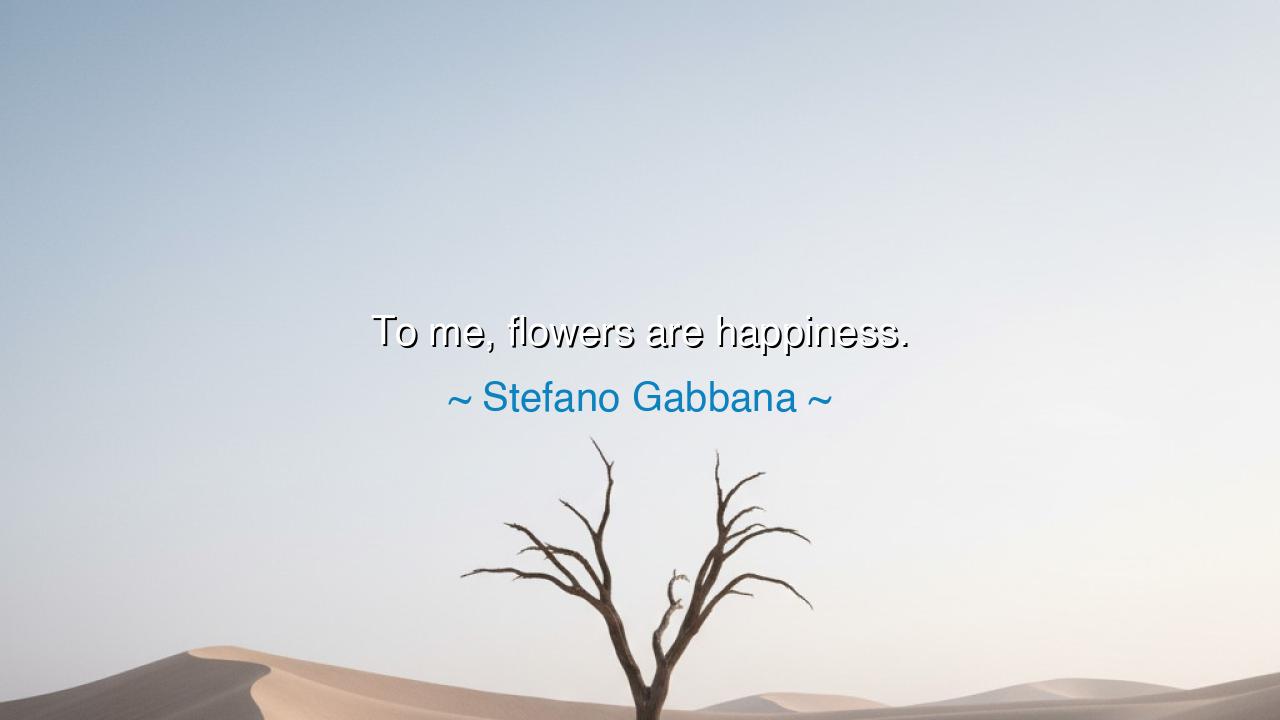
To me, flowers are happiness.






When Stefano Gabbana said, “To me, flowers are happiness,” he spoke a truth both simple and profound—one that echoes the wisdom of the ancients, who saw in every petal the reflection of life itself. His words are not merely about the beauty of blossoms, but about the joy found in creation, the peace born from nature, and the sacred power of simplicity. For the flower, in its quiet grace, teaches what no wealth or fame can: that happiness does not reside in what we possess, but in what we perceive—in the humble act of beholding beauty and being transformed by it.
In the gardens of the world, flowers bloom without ambition. They do not strive, they do not compare, they simply are—radiant expressions of life fulfilling its purpose. Gabbana, the visionary designer, found in them not just inspiration for his art, but a mirror for the human soul. To him, a flower was more than a decoration; it was emotion made visible, a symbol of that fleeting joy which cannot be bought, only felt. Surrounded by the noise of luxury and fame, he looked instead to nature’s quiet masterpiece—to the rose, the lily, the wild bloom that opens to the morning sun without demand—and in that stillness, he found happiness.
The ancients, too, revered the flower as a teacher. The Japanese poets of old saw blossoms as the embodiment of transience—the fleeting perfection of existence. The cherry blossom, falling after a brief but glorious life, reminded them that beauty lies in impermanence. The Greek philosophers spoke of the rose as a symbol of balance—thorns and fragrance intertwined, pain and joy inseparable. And in the temples of India, flowers were offered to the divine, for they represented the purest act of giving: beauty that exists not for itself, but to uplift the world. Thus, when Gabbana declared that flowers are happiness, he joined a lineage of souls who understood that joy is not found in the possession of things, but in reverence for the living moment.
Consider the story of Claude Monet, the great painter of light. In the twilight of his years, he cultivated the gardens at Giverny, where water lilies floated like fragments of heaven upon the pond. Nearly blind, he painted them still, day after day, his brush guided not by sight but by devotion. Those lilies were his salvation, his dialogue with peace. When the world seemed to fade, the flowers remained—constant, wordless messengers of joy. To Monet, as to Gabbana, flowers were happiness—not because they last, but because they remind us to look, to breathe, to marvel while we can.
In every bloom there is a sermon of humility. The flower does not ask the world to see it; it opens even in solitude. It is beautiful because it fulfills its nature, asking nothing in return. So too must we learn to bloom in our own way—to live not for praise, but for purpose. Gabbana’s words, though spoken by an artist of fashion, reach beyond design; they speak to the art of living. True happiness, he suggests, is not an achievement but a state of awareness—the ability to find joy in the small, the natural, the momentary. For the one who can find delight in a single flower holds in his heart the secret to all contentment.
The wise have long said that happiness is not a destination, but a garden cultivated within. Every kind word, every act of gratitude, every moment of wonder is a seed. Like the gardener who tends his blooms through storms and seasons, we too must nurture the inner soil of our hearts with patience and care. When we learn to see the divine in the ordinary—to look upon a flower and feel the miracle of its being—we awaken to a joy that no sorrow can take away. Happiness, then, is not a treasure to be found but a fragrance that arises when the soul is at peace with life.
So, my children of the earth, remember this: seek happiness not in grand triumphs, but in small blossoms. When you pass a field of flowers, stop and let your eyes rest upon their colors. When you feel weary, touch a petal and remember how delicate strength can be. Let your heart be like a garden—open to beauty, generous with love, content to bloom for a season and to rest in its time. For in the end, the truest wisdom is as Gabbana spoke it: “To me, flowers are happiness.” They are the smile of creation itself, whispering to every soul that life, in its simplest form, is already enough.






AAdministratorAdministrator
Welcome, honored guests. Please leave a comment, we will respond soon